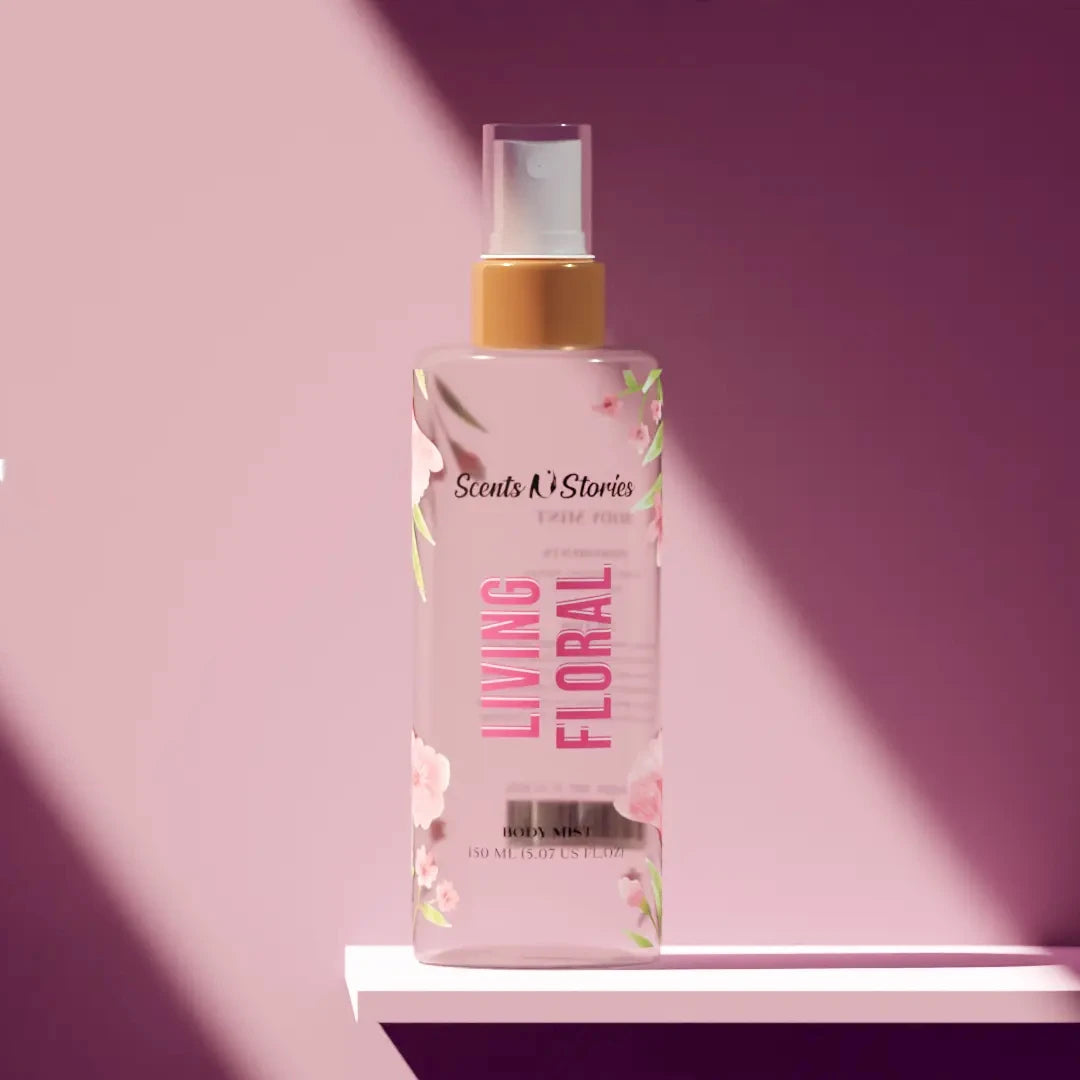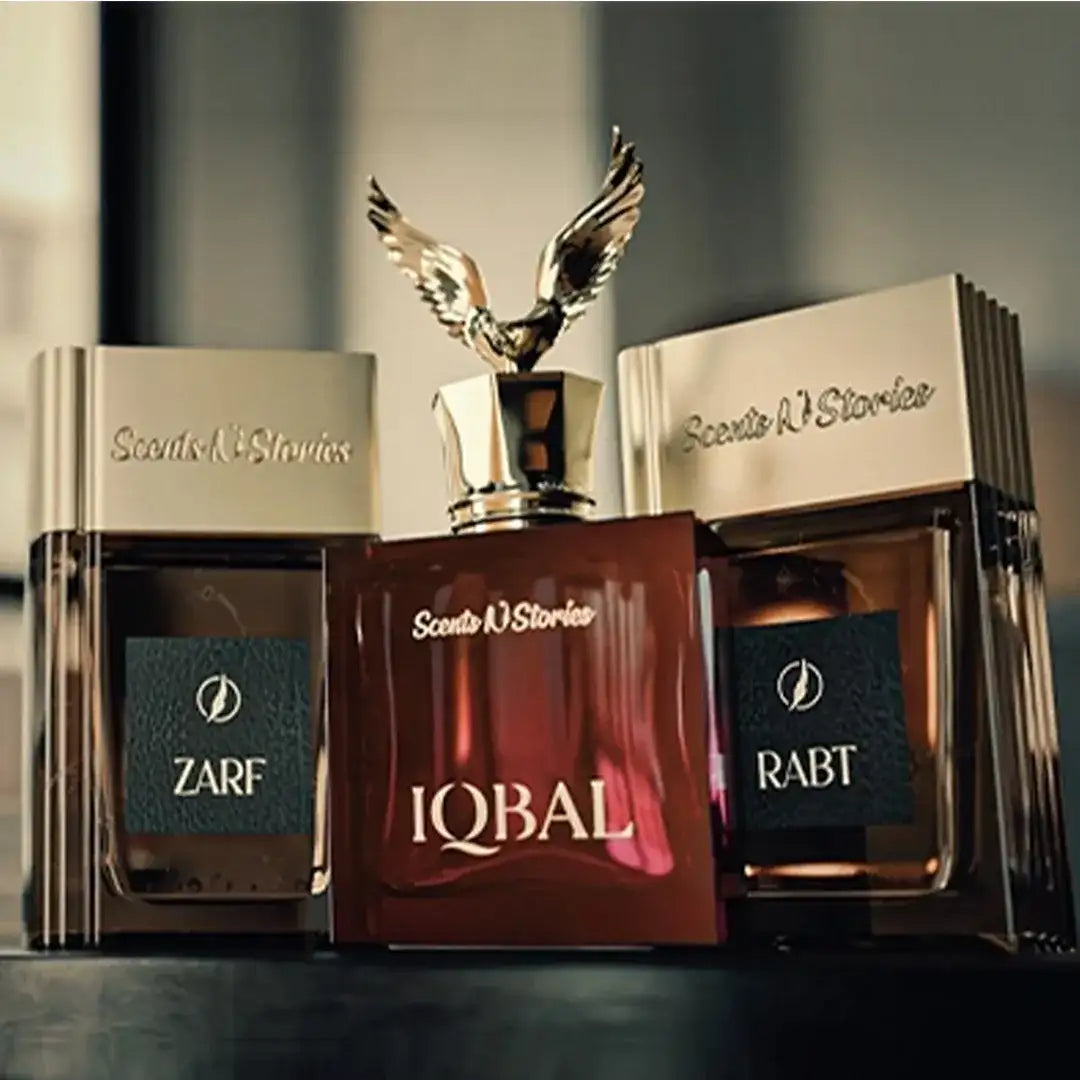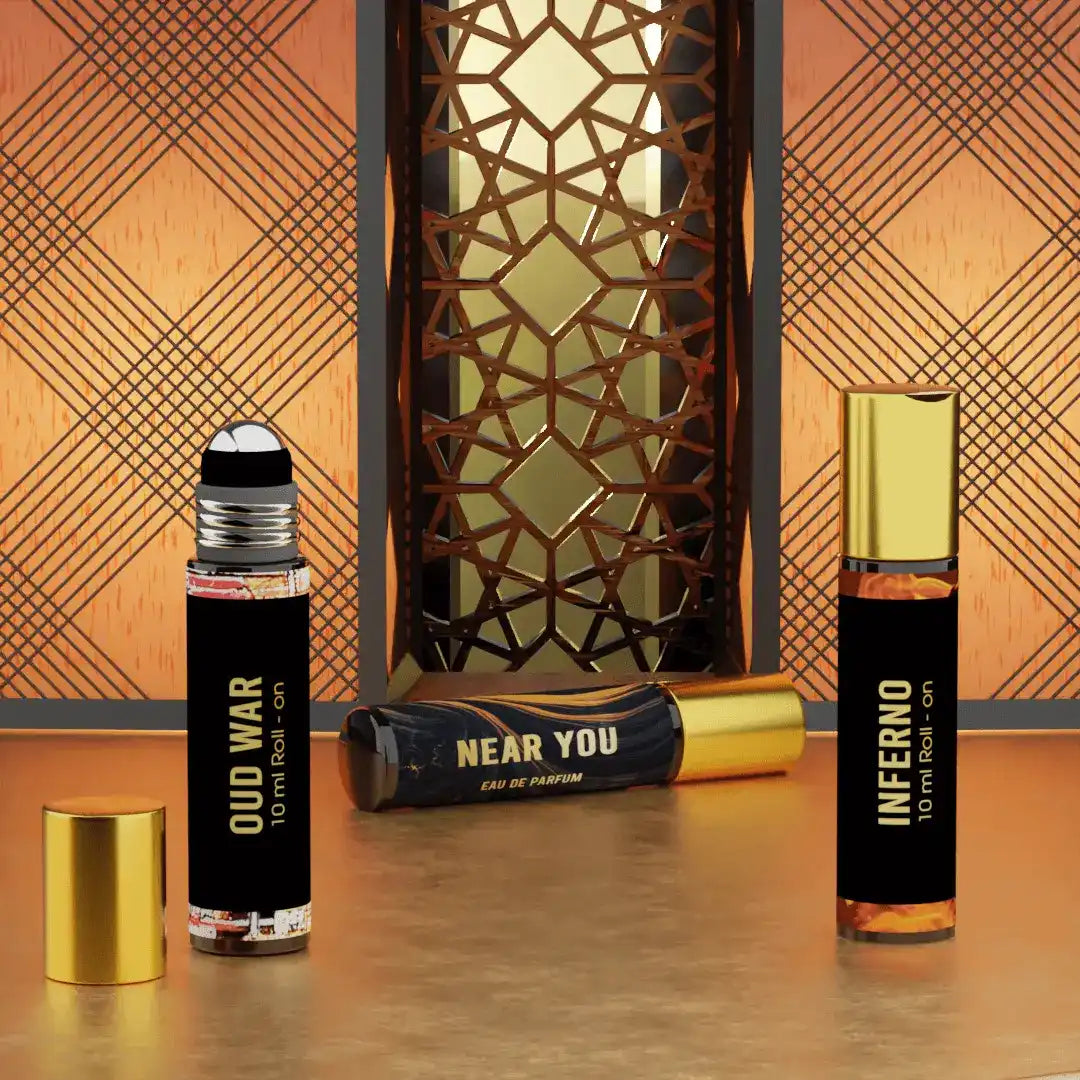Perfume vs. Deodorant: Understand the Key Differences
The terms "perfume" and "deodorant" are sometimes used synonymously when discussing personal perfumes.
However they actually relate to rather different products with different functions. Choosing the best product can be made easier if you know the differences.
At Scents N Stories, we think it's important to inform clients about differences so they can choose fragrances wisely.
In this article, we'll go over the distinctive qualities, applications, and advantages of deodorant and perfume.
Key Differences Between Perfume and Deodorant
|
Feature |
Perfume |
Deodorant |
|
Primary Purpose |
Gives off a pleasing and lingering scent |
Eliminates sweating and regulates body odor. |
|
Composition |
High solvent and fragrance oil concentration |
Has perfumes and antibacterial ingredients. |
|
Longevity |
Generally lasts longer since the concentration of fragrance oil is higher. |
While scent might not linger as long, odor control can work all day. |
|
Application Areas |
Used on pulse spots such as the neck, behind the ears, and wrists |
Usually used on the underarms |
|
Use |
Regarded as a high-end piece for expressive or unique occasions |
A daily necessity for odor control and hygiene |
|
Types |
Parfum, Eau de Parfum, Eau de Toilette, Eau de Cologne, Eau Fraîche |
Stick, Roll-On, Spray, Gel |
What is a Perfume?
A rich, aromatic liquid called perfume. It is usually applied to the skin or garments to leave a pleasing, lingering aroma.
Essential oils, aroma compounds, and solvents such as alcohol are combined to create perfumes that both intensify and maintain the scent.

Types of Perfume
|
Type of Scents |
Concentration of Fragrance Oil |
|
Perfume (Parfum) |
20-30% |
|
Eau de Parfum (EDP) |
15-20% |
|
Eau de Toilette (EDT) |
5-15% |
|
Eau de Cologne (EDC) |
2-4% |
|
Eau Fraîche |
1-3% |
Benefits of Perfume
- Long-lasting Fragrance: Perfumes have a longer-lasting scent because of their higher fragrance oil content.
- Complex Scents: A rich, evocative aroma is produced by the perfume's numerous layers, which often include top, middle, and base notes.
- Luxury and Personal Expression: Perfumes are frequently regarded as a luxury item and a means of expressing one's individual style.
5 Practical Tips to Use Perfume
-
Start with skin that is clean and hydrated. Immediately after a shower is the ideal time to wear perfume.
Your pores are opened by the warm water, and the scent is better kept by a hydrated base. To make the surface smooth for the perfume, use an unscented lotion. -
Focus on pulse points. Areas of your body that are warmer because of the proximity of vessels to the skin's surface. The heat helps to naturally diffuse the scent throughout the day.
Key pulse points include:
-
Wrists
-
Neck (at the base and behind the ears)
-
Inner elbows
-
Behind the knees
-
Hold the bottle 3-6 inches away. This creates a light mist that evenly coats your skin. Spraying too close can lead to an overpowering scent in one spot.
-
Spray, don't rub. A common mistake is rubbing your wrists together after spraying. In fact, this causes the fragrance molecules to break down, which speeds up the fading process.
-
Let the perfume dry naturally. Give the fragrance a moment to settle into your skin before putting on clothes. This allows the scent to fully develop and prevents it from rubbing off onto your fabric.
How to Make Your Perfume Last Longer?
- Layer your fragrance: Use scented products from the same line that complement or match, such as body wash and lotion.
- Spray your hairbrush: For a lighter, longer-lasting scent, mist your hairbrush with perfume. Then run it through your hair. The strands hold the fragrance well.
- Store your perfume properly: Store your bottles somewhere dark and cool. Keep them out of areas with high humidity and direct sunlight, such as bathrooms. Heat and light can break down the fragrance's chemical composition over time.
- Spray your clothes: Fabric can hold scent for a very long time. The scent can last longer if you mist a little on your clothing or a scarf. However, because perfume's alcohol can leave stains, use caution with delicate materials like silk.
- Reapply when needed: If you have a lighter scent (like an Eau de Toilette), you might need to reapply it later in the day. For touch-ups, think about keeping a tiny travel-sized bottle with you.
What is Deodorant?
Deodorant is a type of personal hygiene product that is mostly used to cover up or get rid of body odor that results from sweat's bacterial breakdown.
Deodorants generally incorporate scents to give off a fresh scent in addition to antimicrobial ingredients that lessen the microorganisms that cause body odor.
Types of Deodorant
There are various types of deodorants, and each has a unique way of application:
- Stick: Firm and simple to apply straight onto the skin.
- Roll-On: A rolling ball mechanism is used to apply liquid form.
- Spray: For a rapid and uniform application, use an aerosol or pump spray.
- Gel: Transparent, rapidly drying mixture.
Benefits of Deodorant
- Odor Control: Removes or effectively covers up body odor.
- Antiperspirant Properties: Certain deodorants also include antiperspirant ingredients, such as aluminum compounds, which lessen perspiration.
- Daily Freshness: Offers confidence and a clean aroma all day long.
How to Apply Deodorant?
Applying deodorant correctly is a simple but important part of your daily hygiene routine. Starting with a dry and clean base is crucial.
Here are the general steps for applying deodorant, regardless of the type:
-
Start with clean, dry skin. The best time to apply unscented deodorant is after a shower when your skin is free of sweat and bacteria.
Before applying the product, make sure your underarms are completely dry. Any moisture can make it less effective. - Use the right amount. For most deodorants, a few swipes or a short spray is all you need. Applying too much can lead to product buildup on your skin or clothes.
- Cover the entire area. Make sure to apply the deodorant to the whole underarm area. This ensures complete coverage and protection from odor.
- Wait before getting dressed. Allow a minute or two for your deodorant to fully dry. This prevents it from transferring onto your clothes and leaving white marks.
Specific Application Tips by Deodorant Type
- Stick/Solid Deodorant: Sweep the stick over each underarm two to three times.
- Roll-on Deodorant: To achieve a thin, even layer, roll the product over each underarm a few times.
- Spray Deodorant: Give the can a good shake. Spray for two to three seconds while holding it about 6 inches (15 cm) from your underarm.
What Deodorant should I use with Cologne?
When choosing a deodorant to wear with your cologne, the best approach is to avoid scent clashes.
You have two excellent options:
1. Go Unscented
The safest and best option is this one. An unscented or fragrance-free deodorant ensures that nothing interferes with your cologne's scent.
This lets your cologne be the star and is especially useful if you like to switch up your fragrances often.
2. Choose a Complementary Scent
If you prefer a scented deodorant, pick one that has very light notes that align with your cologne. The goal is to layer scents, not have them compete.
For example:
- Pair a light, fresh deodorant with a citrus or "clean" cologne.
- Use a deodorant with subtle musky notes for a warm, woody cologne.
A great tip: Some cologne brands offer matching deodorants with the exact same scent. This is the ideal method for producing a layered, dependable scent.
Which is Better: Perfume or Deodorant?

You can choose between deodorant and perfume depending on your needs and preferences.
Let us assist you with picking which is best for you:
When Perfume is Better
- Long-Lasting Fragrance: Deodorant is made to cover up or get rid of body odor, so you stay fresh all day.
- Personal Expression: They provide complicated and multi-layered aromas that can convey your distinct sense of style and individuality.
- Special Occasions: Ideal for occasions where a posh and elegant scent is sure to leave a lasting impression.
When Deodorant is Better
- Odor Control: Deodorant is designed to mask or eliminate body odor, keeping you fresh all day.
- Sweat Reduction: Antiperspirant chemicals, which are included in many deodorants, also aid in reducing sweating.
- Daily Use: Quick and simple application for daily freshness makes this product perfect for daily hygiene.
Which Should You Choose: Perfume Vs Deodorant?
It all depends on your preferences and needs when choosing between deodorant and perfume:
- Choose perfume if you're looking for an opulent, long-lasting scent that may be worn on special occasions and acts as a personal signature.
- Choose Deodorant to maintain everyday confidence and freshness while controlling sweat and body odor.
Discover Our Perfume Collections at Scents N Stories
At Scents N Stories, we offer a range of high-quality perfumes to meet your needs. Explore our collection today and find the perfect product for you!
Why Is Selecting the Correct Fragrance Important?
More than just a smell, a fragrance is a representation of your character and state of mind.
The right scent can:
- Boost Confidence: Wearing a fragrance that suits you makes you feel more put-together and self-assured.
- Leave a Lasting Impression: Scents trigger memories, and the right perfume helps people remember you positively.
- Match Your Lifestyle: Fresh citrus scents may suit daily wear. Oud or musky notes work better for evenings and special occasions.
- Enhance Your Mood: Certain notes, like lavender, calm you. While citrus and spicy tones energize you.
FAQs – Perfume vs. Deodorant
Q:1 Is Perfume Better or Deodorant?
Both are great for different things. Deodorant keeps you fresh by fighting body odor. Perfume is for giving you a wonderful, lasting scent.
Q:2 Which Lasts Longer, Deodorant or Perfume?
Perfume lasts much longer. Fragrance oils, which are designed to stay on your skin, are more concentrated in it.
Q:3 Can I Use Perfume on My Armpits?
It's not a good idea. Perfume doesn't stop bacteria that cause odors, and it can irritate the delicate skin under your arms.
Q:4 Can I Use Deodorant as Perfume?
You can't really use it as a substitute. Deodorant's scent is light and is not meant to be a complex, long-lasting fragrance like perfume.
Q:5 Can I Use Both Deodorant and Perfume?
Yes, you can use both deodorant and perfume combo.In fact, it's a great way to create a more complete and long-lasting scent.
Perfume vs Deodorant – Finding Your Balance
Perfume vs deodorant, both serve unique roles in personal care. Perfume adds luxury, self-expression, and a lasting scent, while deodorant ensures freshness and sweat control.
Use deodorant for hygiene and perfume for style. Together, they keep you fresh and memorable all day.
At Scent N Stories, explore premium perfumes that blend luxury and affordability for every occasion.










Leave a comment